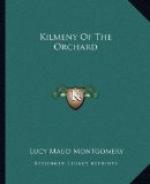“I must see her,” said Eric desperately. “Aunt Janet, be my friend. Tell her she must see me for a little while at least.”
Janet shook her head but went upstairs. She soon returned.
“She says she cannot come down. You know she means it, Master, and it is of no use to coax her. And I must say I think she is right. Since she will not marry you it is better for her not to see you.”
Eric was compelled to go home with no better comfort than this. In the morning, as it was Sunday, he drove David Baker to the station. He had not slept and he looked so miserable and reckless that David felt anxious about him. David would have stayed in Lindsay for a few days, but a certain critical case in Queenslea demanded his speedy return. He shook hands with Eric on the station platform.
“Eric, give up that school and come home at once. You can do no good in Lindsay now, and you’ll only eat your heart out here.”
“I must see Kilmeny once more before I leave,” was all Eric’s answer.
That afternoon he went again to the Gordon homestead. But the result was the same; Kilmeny refused to see him, and Thomas Gordon said gravely,
“Master, you know I like you and I am sorry Kilmeny thinks as she does, though maybe she is right. I would be glad to see you often for your own sake and I’ll miss you much; but as things are I tell you plainly you’d better not come here any more. It will do no good, and the sooner you and she get over thinking about each other the better for you both. Go now, lad, and God bless you.”
“Do you know what it is you are asking of me?” said Eric hoarsely.
“I know I am asking a hard thing for your own good, Master. It is not as if Kilmeny would ever change her mind. We have had some experience with a woman’s will ere this. Tush, Janet, woman, don’t be weeping. You women are foolish creatures. Do you think tears can wash such things away? No, they cannot blot out sin, or the consequences of sin. It’s awful how one sin can spread out and broaden, till it eats into innocent lives, sometimes long after the sinner has gone to his own accounting. Master, if you take my advice, you’ll give up the Lindsay school and go back to your own world as soon as may be.”
CHAPTER XVII. A BROKEN FETTER
Eric went home with a white, haggard face. He had never thought it was possible for a man to suffer as he suffered then. What was he to do? It seemed impossible to go on with life—there was no life apart from Kilmeny. Anguish wrung his soul until his strength went from him and youth and hope turned to gall and bitterness in his heart.
He never afterwards could tell how he lived through the following Sunday or how he taught school as usual on Monday. He found out how much a man may suffer and yet go on living and working. His body seemed to him an automaton that moved and spoke mechanically, while his tortured spirit, pent-up within, endured pain that left its impress on him for ever. Out of that fiery furnace of agony Eric Marshall was to go forth a man who had put boyhood behind him for ever and looked out on life with eyes that saw into it and beyond.




